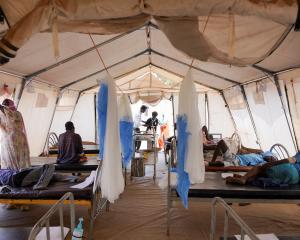Only one week ago, Russian President Vladimir Putin's spokesman said that, in the present circumstances, he regarded the presidential election scheduled by the Ukrainian Government in Kiev for May 25 as ''absurd''.
Last Wednesday, however, Putin conceded that the election could be ''a move in the right direction''.
Putin also said that he was going to pull back the 40,000 Russian troops who have been doing ''military exercises'' close to Ukraine's eastern border.
He even asked the heavily armed pro-Russian separatists in Ukraine's eastern provinces of Donetsk and Luhansk, who have seized government buildings in a dozen eastern cities, to postpone the referendum on independence or unification with Russia that they had scheduled.
So a lot of people hope that he has decided to call off the confrontation. Maybe he has, but you have to read the fine print.
What Putin actually said about the presidential elections that the Government in Kiev has called for the 25th was less than enthusiastic: ''I would like to stress that ... while they are a move in the right direction, [they] will not decide anything if all the citizens of Ukraine fail to understand how their rights are protected after the elections are held.''
Moreover, a ''senior source'' close to Putin subsequently said that he would support the Ukrainian presidential elections on May 25.
If talks started between the Government in Kiev and the armed separatists in the east, and IF Kiev stopped trying to take the towns they control back by force. That leaves him room to welsh on his promise.
As for Putin's request that the separatists call off their referendum on independence, they rejected it the next day.
Russian agents have been heavily involved in orchestrating the seizure of government buildings in eastern Ukraine from the start, so it's hard to believe that he couldn't get the separatists to cancel the referendum if he really tried.
And though he has promised to pull his troops back from Ukraine's border, they have not actually begun to move yet.
So you have to wonder whether he is really going to call off the confrontation. Maybe he is just trying to stave off further Western sanctions while his plans to destabilise the Government in Kiev, disrupt the presidential elections and maybe even take over eastern Ukraine continue to unfold.
Nobody can read Putin's mind, but there is reason to suppose that his change of tone might be genuine, because he is saying he will do exactly what level-headed strategic advisers in his entourage would be urging him to do.
If this confrontation continues down the road it has been travelling recently, it will hurt Russian interests, and even his own political interests, a lot.
Putin has little to gain from a local victory in Ukraine. Seizing the country's eastern provinces would simply land Moscow with the permanent job of spending a great deal of money to support an industrial museum.
And taking control of all of Ukraine might lead to a long counter-insurgency war against Ukrainian nationalists.
The external costs of ''victory'' would be even higher. Already Nato is moving troops into the Eastern European members of the alliance to reassure the local populations, who live in permanent fear of another Russian takeover. (Previously, it did not station foreign troops in those countries, in order not to frighten the Russians.)
Even the Swedes and the Finns, who are neutrals, are discussing closer co-operation in defence matters.
The next round of Western sanctions will really hurt the Russian economy, and that would undermine Putin's political popularity at home.
And if it really turns into a new Cold War, Russia would lose far faster than it did last time.
The Russian Federation has only half the population of the old Soviet Union, and considerably less than half the industrial resources and technological prowess of that former superpower.
It would make sense for Putin to end this confrontation: he has already taken Crimea, and that is victory enough. Russian-speakers are not at risk in Ukraine, and never have been.
Ukraine is not going to join Nato or the European Union no matter who wins the elections on May 25. Neither organisation would let them in. But he can't just throw his cards on the table and walk away: he has to save face.
That may be enough to explain why his statements and actions this week have been shrouded in a good deal of ambiguity.
Alternatively, he may just not be listening to his advisers, or they may be too intimidated to tell him what they really think, in which case he hasn't really changed course and all this talk is a ploy to gain time.
But Putin has been running Russia for 14 years and in all that time, he has not made a major strategic error. He is not stupid, and he has shown no signs of being delusional. My guess is that he has decided to shut the confrontation down.
Gwynne Dyer is an independent London journalist.












